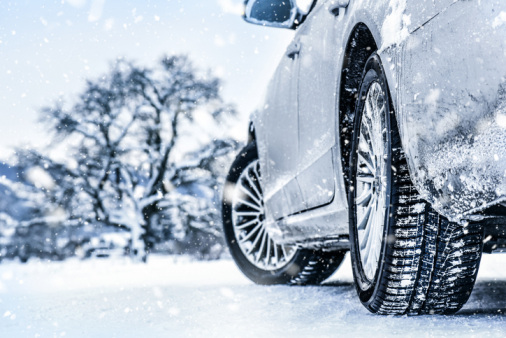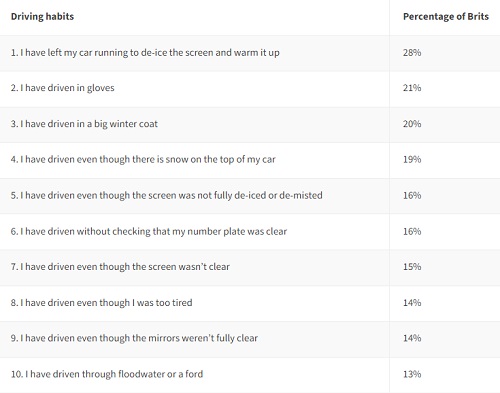Winter is coming: 32 million Brits admit to making costly car mistakes

Authored by Aviva
- More than a quarter of Brits (28%) admit to leaving the car-running unattended to de-ice screens
- Common mistake could lead to people facing a fine and potentially being unable to claim on their insurance if their vehicle is stolen
- Almost half (45%) admit to driving with limited visibility
- More than half (57%) wear inappropriate clothing / footwear such as gloves and wellies
As winter takes hold and temperatures start to drop, research by Aviva reveals the most common mistakes drivers could be making when it comes to getting behind the wheel this winter.
The research, which surveyed 2,000 Brits, reveals that more than a quarter (28%) are leaving their cars running to de-ice screens, with older generations most likely to take the risk. Over a third of those aged 75+ (41%) and those aged 65-74 (34%) leave their car on to de-ice screens, compared to 17% of 18-24 year-olds and 24% of 25-34 year-olds.
By doing so, Brits may be unwittingly putting themselves at risk with most car insurance policies excluding thefts of vehicles while the engine is still running. This is also an offence under Section 42 of the Road Traffic Act 1988 which states that drivers cannot leave vehicles running and unattended while on a public highway, otherwise known as ‘quitting’.
When looking at visibility, the research reveals that almost half (45%) of Brits have driven without making sure that their screens and mirrors were properly clear. By doing so, motorists could also be risking a fine under Section 229 of the Highway Code, which states that all drivers ‘must be able to see, so clear all snow and ice from all windows’.
Table: The top 10 winter driving habits that could cause issues are revealed as:

Other driving habits include leaving the car unlocked to quickly pop into somewhere (13%), pouring boiling water over a car windscreen to de-ice it (11%) as well as wearing inappropriate footwear such as heels (9%) or wellies/snowboots (7%). Those driving whilst wearing inappropriate clothing and footwear could also risk a fine under Rule 97 of the Highway code which states that you should ensure: ‘clothing and footwear do not prevent you using the controls in the correct manner’.
Martin Smith, Motor Claims Manager at Aviva, comments: “All drivers have a legal responsibility to ensure their vehicle is in a roadworthy condition and this means making sure all windscreens and mirrors are clear of any snow, leaves, debris, ice and dirt.
“While we all want to get to our next destination as quickly as possible, it pays to be safe, particularly as the risk of an accident typically increases during the winter months. Spending five or ten minutes to prepare your car means that not only are you more likely to avoid an accident, but also a hefty fine - which can be as much as £1,000 - points on your licence or even a driving ban in the worst case scenario.
“If you do leave the engine running to de-ice your car, be sure to remain in your vehicle at all times. Failing to do so means that you may not be able to make a claim on your insurance in the event that your vehicle is unfortunately stolen.”
Aviva’s five top tips for driving safely during tough weather conditions include:
- Lights: During heavy snow or even heavy rain during winter days, using your headlights instead of daytime lights means that you are more visible to other drivers.
- Gears: When setting out, starting off in second gear can help avoid wheel spin during ice and snow conditions. Drive in the highest gear possible, and at a very slow speed when on flat ground. When driving downhill, use third or fourth gear. When turning a corner use a lower gear. If your car is an automatic, consider using the manual override function. This will enable you to select the right gear to avoid braking as it can lead to skidding. In icy and snowy conditions, stopping distances can be increased tenfold so keep this in mind at all times.
- Slow and steady: Accelerate and brake very gently and gradually, to avoid your car skidding. During wet and icy weather, the stopping distance significantly increases and so it’s important to leave as much room as you can between your car and the vehicle in front. Winter tyres may also help when it comes to gripping during tough weather conditions – just be aware that in some instances, you may need to let your insurer know if you are using them.
- Be alert: Be particularly careful of roads in shaded areas, either by trees or buildings. It’s in these areas that black ice can often be found, as sunlight cannot reach them.
- Never drive through flood water and take caution driving through fords or tides. Avoid driving through flood water where possible. It’s difficult to see how deep the water may be and you could end up becoming stranded or swept away. Just 30cm of fast-flowing water is enough to move a car. During bad weather, fords and tides may be higher than usual and so if you’re ever in doubt, find an alternative route or wait for the tide to lower. It only takes a small amount of water to ruin an engine, so it pays to be
About Aviva
Aviva Insurance Limited is one of the UK’s leading insurance companies, part of the Aviva group with 34 million customers Worldwide. Aviva Insurance has been in the insurance business for more than 300 years.
In UK commercial, the insurance market remains challenging for insurance brokers and customers, due to the ongoing economic conditions. Aviva Insurance are focusing on improving our processes to ensure Aviva provide commercial customers with insurance cover at an acceptable price. Insurance brokers also recognised our excellent customer service by voting us Insurance Times General Insurer of the Year in 2012, for the second year running. youTalk-insurance sharing Aviva insurance news and video.

